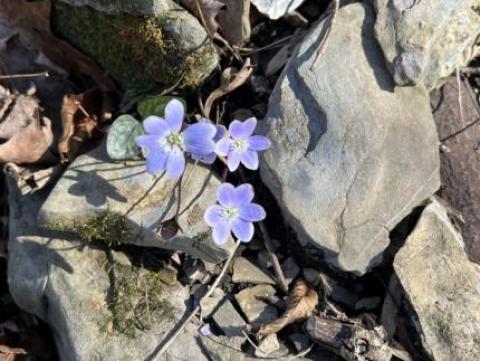
A small group of friends in the cohousing community where I moved almost two years ago have been meeting regularly to deepen relationship with one another. We try to practice authenticity and help each other navigate around the eddies and whirlpools of life in intentional human community and through the shoals of this chapter of Earth’s story. Not long ago we watched a video of the storyteller Martin Shaw relating an old and powerful tale, “The Handless Maiden”. The invitation was to allow the story to sit beside us for a while and perhaps, if it seemed right, to relay to one another what happened. What emerged for me seeded this reflection.*
I want to be the woman who grew her hands back. But I am not. At least not yet. I am someone trying to stay upright, trying to bend gracefully with the latest buffeting wind, and to return to standing grounded and radiating compassion. But as Mary Oliver says, I am so distant from the hope of myself.
In days gone by I wandered a forest, one much friendlier but no less mysterious than the woods of the fairytale. Stories rose from the mulch underfoot, from tree bark and stone, from dry creek and mirrored pond, from frog and fox, snake, and moth, and I wrote them down. Now the scenery around me is a village of bright houses nestled in garlands of native plants, and the inhabitants are far more human. I wonder about what stories lie underfoot here. I have been waiting to find out, it seems, for quite some time.
Old tales like The Handless Maiden are full of eternal presences trying to break into this world with vital information to impart. One of the things they tell us is that humans are as enmeshed in the fabric of Being as everything else: not separate from nature, not central or above or better, but woven humbly and inextricably into it.
The Handless Maiden enters the forest not once, but twice and there she is tried and seasoned until she comes first to an edge, an orchard outside a castle, and finally to a nurturing community where she grows her hands back. The tale is stunning, unpredictable; the wild landscape of the story and the human characters are threaded in a seamless, surprising, and ever-circling mystery.
Human nature, it turns out, is wild nature. Our inner landscapes open to vast plains of imagination and wells of loving impulses as well as dark forests and ferocious creatures. Encounters with human animals can be as mysterious and wondrous as those with foxes or turtles. The village is as unpredictable and as treacherous as a thousand acres of mountain forest in a windstorm, and shimmers with the same sacred beauty. This is what has knocked me back on my heels.
The moon tonight is nearly full, luminous above the rooftops, and shining through the high window above my kitchen. My village friends, keen observers of the wide night sky overhead, keep us alerted about comets, planetary conjunctions, and bright stars. Wednesday morning as a few of us weeded the garden beds in preparation for spring planting we were aware of the red-bellied woodpeckers providing percussion for songbirds celebrating the sun. Spring ephemerals are emerging, as noted by a Shepherd Village member as she walked along a trail leading down a hill toward the old canal and the river. She sent notice to the whole Shepherd Village community, knowing we would be entranced, “These Hepaticas were on the Ferry Hill Trail, just across the river yesterday”. My grandson, visiting over the weekend, found a quiet place to read under the welcoming branches of the towering fir tree in the graveyard adjacent to the north end of the village, a grandmother tree many of us walk by and greet daily. Wild nature, ancient and original nature, simply admiring itself.
Tales like The Handless Maiden manage to hold everything: forest and castle, betrayal and compassion, wilderness and village, selfishness and sacrifice, suffering, loss, redemption, healing, joy. It’s the story of each of us, and each of us woven into the wild family of things, the myriad stories eternally underfoot everywhere.
*There are many ways to tell a story and many versions of "The Handless Maiden". Martin Shaw's can be found in his book Smokehole: Looking to the Wild in the Time of the Spyglass.